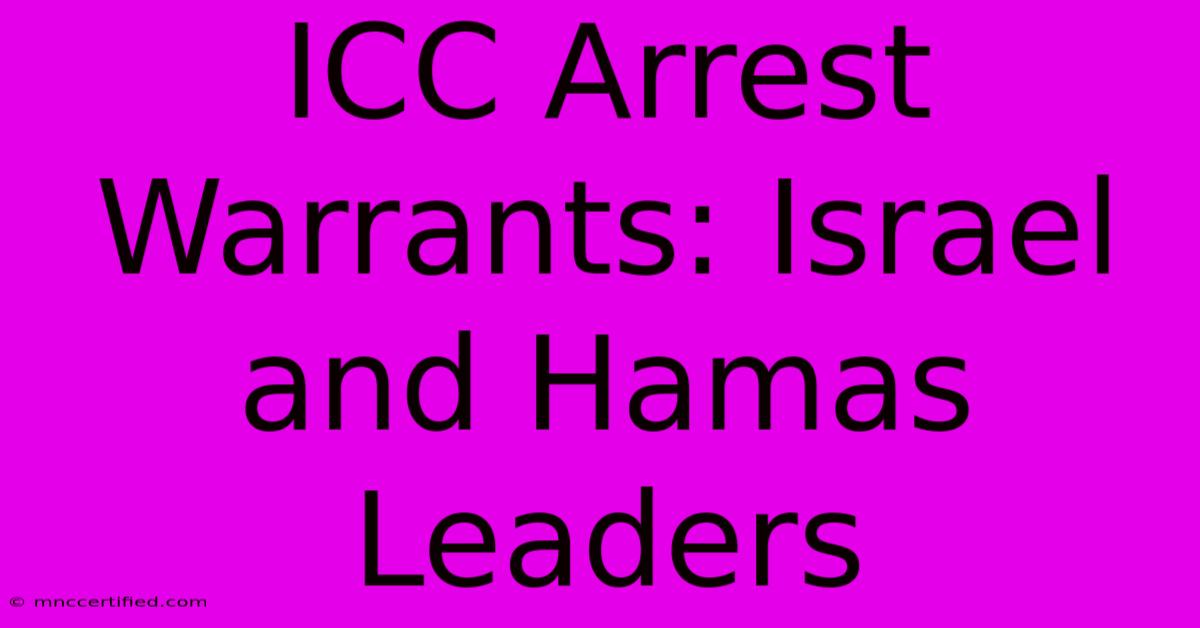ICC Arrest Warrants: Israel And Hamas Leaders

Table of Contents
ICC Arrest Warrants: Israel and Hamas Leaders – A Complex Legal Landscape
The recent issuance of arrest warrants by the International Criminal Court (ICC) targeting leaders from both Israel and Hamas has ignited a firestorm of international debate. This complex situation involves deeply rooted conflicts, differing legal interpretations, and significant geopolitical implications. Understanding the intricacies of the ICC's actions requires examining the legal basis for the warrants, the political ramifications, and the potential consequences for all parties involved.
The ICC's Jurisdiction and the Basis for the Warrants
The ICC's jurisdiction is based on the Rome Statute, an international treaty that establishes the court's powers to prosecute individuals for war crimes, crimes against humanity, and genocide. Critically, states must be parties to the Rome Statute for the ICC to have jurisdiction over crimes committed on their territory. Neither Israel nor Palestine is a full member state of the ICC, creating a complex jurisdictional challenge.
However, Palestine's declaration of acceptance of the Rome Statute in 2015 forms the basis for the ICC's assertion of jurisdiction over alleged crimes committed in the Palestinian Territories. This decision has been fiercely contested by Israel, which argues that the ICC lacks jurisdiction in this context. The ICC, however, has maintained its position, leading to investigations and the subsequent issuance of arrest warrants.
Understanding the Allegations
The ICC investigations focus on alleged war crimes and crimes against humanity committed during various conflicts, including the 2014 Gaza War and ongoing hostilities. The warrants themselves allege specific actions and responsibilities for these alleged crimes by named individuals on both sides of the conflict. The exact details of the accusations remain subject to ongoing investigations and legal processes. It's crucial to distinguish between allegations and proven guilt, as the warrants are not judgments of conviction.
Geopolitical Implications and International Reactions
The ICC's actions have provoked strong reactions from various countries and international actors. Israel has vehemently rejected the court's jurisdiction and has condemned the warrants as politically motivated and biased. Many of Israel's allies have also voiced concerns about the court's actions, highlighting concerns about potential implications for their own national security interests.
Conversely, Palestine and many other states view the warrants as an important step towards accountability for alleged atrocities. They see the ICC as a crucial mechanism for international justice, particularly in situations where national judicial systems are unable or unwilling to investigate and prosecute such crimes. The international community remains deeply divided on the issue, highlighting the sensitive and controversial nature of the ICC's involvement in the Israeli-Palestinian conflict.
The Challenges of International Justice and Accountability
The ICC's intervention in this complex geopolitical context highlights the broader challenges of achieving international justice and accountability for war crimes. The issue is further complicated by the deeply entrenched political divisions and the lack of a universally accepted legal framework for resolving such disputes. The enforcement of the arrest warrants also presents significant practical challenges, potentially leading to further escalation of the conflict.
Future Prospects and Uncertainty
The long-term consequences of the ICC's actions remain uncertain. The possibility of arrests and subsequent trials remains a source of significant tension. The outcome will likely depend on various factors, including the political will of involved nations, the cooperation of states with the ICC, and the legal proceedings themselves. The situation underscores the limitations and challenges of relying on international institutions to address deeply rooted conflicts and achieve justice in highly contested political environments. The ongoing legal battles and political maneuvering will undoubtedly shape the future trajectory of the conflict and the role of the ICC in this volatile region.
This article provides a comprehensive overview of the situation surrounding the ICC arrest warrants for Israeli and Hamas leaders. It's vital to remain informed about further developments and to critically analyze information from diverse sources to achieve a balanced understanding of this complex and evolving situation. Further research into the ICC's Rome Statute and the specifics of the ongoing investigations is highly recommended for a deeper understanding of this critical issue.

Thank you for visiting our website wich cover about ICC Arrest Warrants: Israel And Hamas Leaders. We hope the information provided has been useful to you. Feel free to contact us if you have any questions or need further assistance. See you next time and dont miss to bookmark.
Featured Posts
-
Lsu And Michigan Nil A Side By Side
Nov 22, 2024
-
Dry Insurance Chagrin Falls Ohio
Nov 22, 2024
-
Jones Practices Safety After Giants Cut
Nov 22, 2024
-
Skubal Sale Win Cy Young Awards
Nov 22, 2024
-
Richard Coles I M A Celebrity 2024
Nov 22, 2024